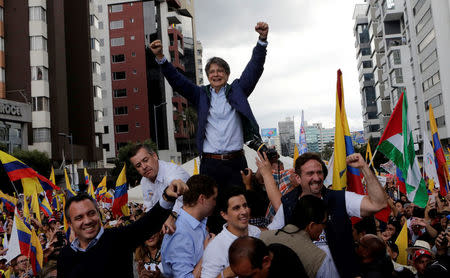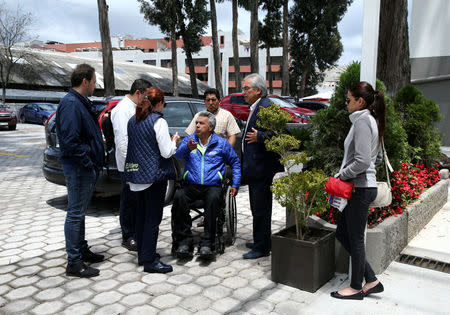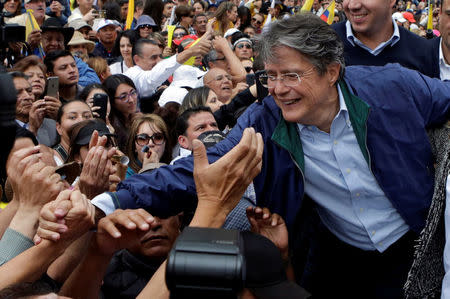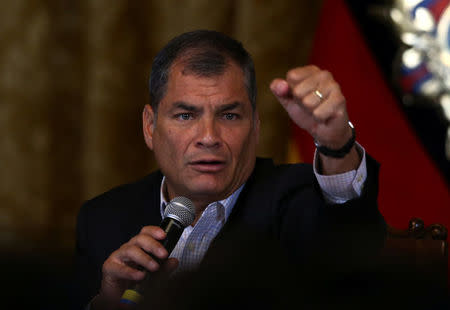Ecuador presidential election goes to runoff between leftist, ex-banker
By Alexandra Ulmer and Alexandra Valencia QUITO (Reuters) - Ecuador's presidential election will go to an April runoff between leftist government candidate Lenin Moreno and ex-banker Guillermo Lasso, the electoral body said on Tuesday, after a nail-biter first round over the weekend. Moreno needed 40 percent of valid votes and a 10 percentage-point difference over his nearest rival to win outright. He was the clear leader of Sunday's election, pocketing 39.21 percent of valid votes versus 28.34 percent for Lasso, with 95.3 percent of votes counted. With the Andean country on tenterhooks and the opposition protesting for prompt results, the electoral body said the results could not change although it was waiting for all ballots to be counted before officially proclaiming a second round. "No, it's not possible," electoral council president Juan Pablo Pozo told reporters, when asked if a runoff could be avoided. "But we have to wait for official results to be 100 percent." Opposition protesters had massed in front of the electoral council headquarters in mountainous capital Quito since Sunday to denounce what they say were fraud attempts. The government retorted they were inciting violence and urged patience. Ecuador's fragmented opposition is now expected to close ranks around Lasso in a runoff amid anger over an economic downturn and a series of corruption scandals, potentially ending a decade of leftist rule in Ecuador. Should Ecuador move to the right with a second-round victory for Lasso, it would follow on the heels of Argentina, Brazil and Peru which have all swerved away from the left as a China-led commodities boom ended. Lasso has campaigned on a platform to revive the economy, which is dependent on exports of oil, flowers and shrimp, by slashing taxes, fostering foreign investment and creating a million jobs in four years. He has also vowed to remove Wikileaks founder Julian Assange from the Ecuadorean embassy in London and denounce Venezuela's Socialist government. Some Lasso supporters honked their horns in Quito, but others were more cautious. "We can't celebrate until they've officially announced a second round," said Maria Isabel Pino, 36, in the coastal city of Guayaquil. LASSO VS. MORENO Still, some disillusioned Correa supporters see Lasso as an elitist who might slash social programs, and the ruling Country Alliance remains popular with many of the country's rural poor. "The second round will be tight," said pollster Blasco Penaherrera, who has not yet run any surveys about the runoff. Moreno, who is paraplegic since being shot during a robbery some two decades ago while he was out buying bread, on Tuesday expressed confidence he would become one of the world's rare disabled presidents. "Do you see me desperate? It's because we're going to win the elections just like we won the first round," said Moreno, who promises support for single mothers, the elderly, and disabled Ecuadoreans. Many Ecuadoreans link Lasso with the 1999 banking crisis when hundreds of thousands lost their savings and many migrated to Spain or the United States. "We don't want a corrupt banker as president," said Moreno supporter Tatiana Manosalvas, a 45 year-old taxi driver. "We can't return to our history of instability when the richest stole our money with impunity." Lasso has defended himself by saying the bank he ran for almost 20 years, Banco de Guayaquil, was solid and survived the meltdown. He says it is Ecuador's leftist government that is hiding corruption behind a false rhetoric of helping the poor. Bribery scandals at state oil company Petroecuador and Brazilian conglomerate Odebrecht are indeed weighing on the ruling party. A fugitive former oil minister regularly accuses Moreno's running mate Jorge Glas, the former head of Strategic Sectors, of being "the ringleader" of a graft operation at Petroecuador. Glas has denied the accusations. Under pressure, Moreno has vowed "major surgery" to remove malfeasance and Glas has kept a low profile towards the end of the campaign. But corruption is now one of the top issues for Ecuadoreans alongside the economy and jobs. And after a decade of governance by mercurial president Rafael Correa, many in the country of 16 million say they are also tired of his confrontational style and alliances with Cuba and Venezuela. "This has to end, it's ended in Argentina, now it will end in Ecuador, and next up is Venezuela," said student Carlos Vallarino, 24, who voted for Lasso. (Additional reporting by Yury Garcia, Jose Llangari, Diego Ore and Andrew Cawthorne; Writing by Alexandra Ulmer; Editing by James Dalgleish and Phil Berlowitz)

 Yahoo News
Yahoo News 





